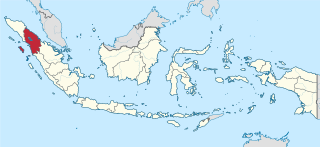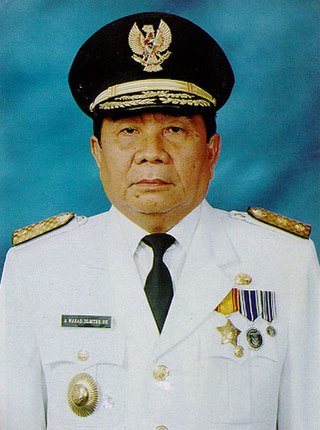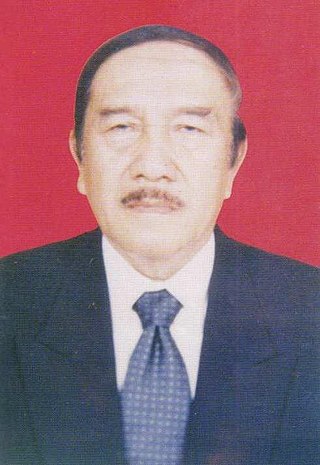
North Sumatra,also called North Sumatra Province,is a province of Indonesia located in the northern part of the island of Sumatra,just south of Aceh. Its capital and largest city is Medan on the east coast of the island. It is bordered by Aceh on the northwest and Riau and West Sumatra on the southeast,by coastlines located on the Indian Ocean to the west,and by the Strait of Malacca to the east.

The Mandailing are an ethnic group in Sumatra,Indonesia that is commonly associated with the Batak people. They are found mainly in the northern section of the island of Sumatra in Indonesia. They came under the influence of the Kaum Padri who ruled the Minangkabau of Tanah Datar. As a result,the Mandailing were influenced by Muslim culture and converted to Islam. There are also a group of Mandailing in Malaysia,especially in the states of Selangor and Perak. They are closely related to the Angkola and Toba.
Marga is a term in Batak societies referring to a clan name. The term is derived either from the Sanskrit varga,meaning company,party,or group,or,more likely,from the Sanskrit marga,meaning 'road,way or path',referring to a people of 'one origin'.

North Padang Lawas is a landlocked regency in the North Sumatra province of Indonesia. It has an area of 3,918.05 km2,and had a population of 223,049 at the 2010 census and 260,720 at the 2020 census;the official estimate as of mid-2023 was 275,448. North Padang Lawas Regency was created on 17 July 2007 from the eastern parts of the South Tapanuli Regency. Its administrative seat is the town of Gunung Tua.

Toba Batak people are the largest ethnic group of the Batak peoples of North Sumatra,Indonesia. The general term ‘Batak’is sometimes used to refer to the Batak Toba people,for one thing because the Toba people are the largest sub-group of the Batak ethnicity,for another because they tend to self-identify as merely Batak instead of ‘Toba’or ‘Batak Toba’,contrary to the habit of the Karo,Mandailing,Simalungun,Pakpak communities who commonly self-identify with their respective sub-groups.

Abdul Hakim Harahap was an Indonesian politician who held various positions,including deputy prime minister,in the 1950s.

PanditaRoos Telaumbanua was an Indonesian Nias priest,politician and bureaucrat,who served as the Regent of Nias,acting Mayor of Medan,acting Governor of Sumatra,and the member of People's Representative Council.

Pieter Sibarani was an Indonesian politician and bureaucrat who served as the Vice Governor of North Sumatra from 1994 until 1999.

Raja Junjungan Lubis was an Indonesian Mandailing politician who became the Regent of Batanggadis,Regent of Central Tapanuli,Mayor of Sibolga,Governor of North Sumatra,and member of the People's Representative Council.

The Governor of North Sumatra is the highest office in the province of North Sumatra. The governor of North Sumatra is an elected official who is responsible for leading the government in North Sumatra,proposing and enacting regional laws,and representing the North Sumatra province inside and outside the court. The governor alongside the deputy governor and 100 members of the Regional People's Representative Council are accountable for the strategic government of the province of North Sumatra.
The 1998 North Sumatra gubernatorial election was an indirect election held to elect the Governor of North Sumatra for the 1998–2003 term. All members of the Regional People's Representative Council of North Sumatra were eligible to vote for this election.
The 1993 North Sumatra gubernatorial election was an indirect election held to elect the Governor of North Sumatra for the 1993—1998 term. All members of the Regional People's Representative Council of North Sumatra were eligible to vote during this election.
The 1963 North Sumatra gubernatorial election was an indirect election held to elect the Governor of North Sumatra for the 1963–1968 term. All members of the Regional People's Representative Council of North Sumatra were eligible to vote for this election.

Abdul Wahab Dalimunthe was an Indonesian bureaucrat and politician. He served as the Vice Governor of North Sumatra from 1997 until 2003,Speaker of the North Sumatra Regional People's Representative Council from 2004 until 2008,and MP from 2009 to 2014 and from 2017 until his death.

Amru Helmy Daulay was an Indonesian politician. A member of Golkar,he served as regent of Mandailing Natal from 2000 to 2010.

Alimuddin Simanjuntak was an Indonesia bureaucrat who became the Vice Governor of North Sumatra from 1988 until 1994.














